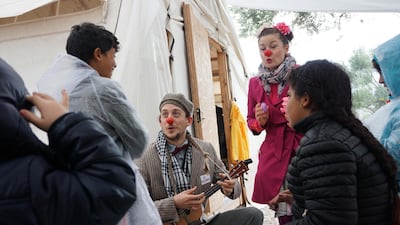A group of clowns are making a difference to children in refugee camps across Europe and the Middle East.
Red Noses International, founded in 1994, has sent its clown emissaries to brighten the day of refugees in Jordan, Ukraine, the Balkans and now Greece, where most refugees who have travelled across the Mediterranean sea first land in Europe.
It’s all part of the Emergency Smile programme, an expansion of RNI’s traditional work entertaining children in European hospitals to refugee camps.
Its latest mission to the Greek Island of Lesbos was sparked by a devastating report from aid charity Medecins sans Frontieres (MSF) in August, which claimed children as young as 10 were at risk of suicide due to the conditions in the island’s Moria camp.
Moria, established in 2015 and run by the Greek government, hosts more than 5,000 people in a space designed for 3,100. It has long been criticised for poor and unhygienic conditions as well as violent clashes between residents, as sectarian and national divides come into play.
Upon reading the alarming report, and with six months of experience in Greece’s mainland refugee camps behind them, RNI’s head of mission Frederik Birnbaum and his team made the call to send some of their 30 specialist clowns in November. They attempt to offer psychosocial support and light relief for some of the affected children and their families, working with MSF and other local partners.
The clowns were a popular addition to the daily lives of detained refugees, in particular when it came to vaccinating over 1,000 children from the island’s camps over a three-day period, said Marko Kalc, a performing artist and Red Nose clown from Croatia.
Mr Kalc, who specialises in playing the ukulele, acting, dancing and hula hooping, set to work using some of these skills to comfort the children in the waiting room, and later during the vaccination process, too. He tells a heartwarming tale of a 12-year-old girl who was terrified of the needles, but was comforted by the presence of his big red nose.
"Everybody around us was laughing and the vaccination was over in a second," he told The National. "The doctor said, "Wow, you just got vaccinated with laughter."
Mr Kalc added: “For me this was a really nice moment and I felt that they understood what we do and they appreciated it.”
Hospital staff seem to agree, with glowing testimonials appearing on the group’s website.
“The Red Noses Clowns are working very professionally, bringing a positive feeling to the clinic and working in perfect connection with the medical staff. Thanks to their presence, we had no big dramas in the tents. It was a huge help,” writes Joyce Bakker, a nurse activity manager from MSF Greece.
_______________
Read more:
Oxfam says EU is failing vulnerable refugees in Lesbos
'Hero of the Aegean' who saved thousands of refugees dies in Greece
'Work is life' for the refugee-entrepreneurs of Greece's Ritsona camp
_______________
Not just anyone can become an RNI clown, says Mr Birnbaum.
“It takes three years to become a Red Noses clown, it is not just someone putting on a red nose and going into a hospital. What makes us stand out is the level of preparation that goes into it, the artistic level is high.”
RNI’s clowns generally come from a performing arts background, be that music, acrobatics, dance or acting, and are given rigorous training to ensure they are ready for every scenario, including basic medical and psychological training. Most of the 390 clowns trained by the charity operate in hospitals and elderly care homes, but those who choose to take on the extra challenge of a refugee camp are given additional training.
What’s most important to remember, says Mr Kalc, is “we are guests".
“Of course we can feel more or less like a part of the hospital family, or any situation we go to, but we always have to take care not to disturb anyone. We are here to support."
Mr Birnbaum agrees, and says that RNI clowns have something different to offer from the scores of entertainment charities who end up in refugee camps in Europe and further afield.
“There are other clowns coming here, great clowns from the circus and they are wonderful at what they do, but they are not hospital clowns.
“We feel that by reaching the children and the parent on this personal level we give them something very special that they take with them when they leave. We can see how well it works in the moment.”
The group plans to continue its work in Greece and other crisis areas in 2019.



